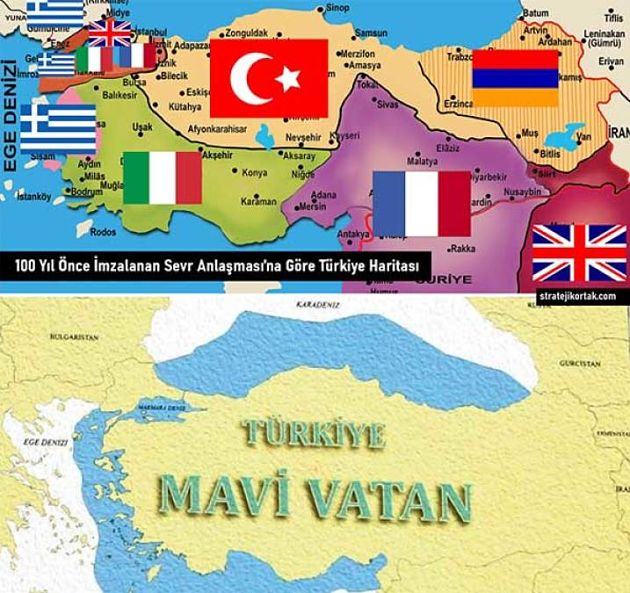Recently, Turkey celebrated the anniversary of Victory Day — Zafer Bayramı of 1922, when its new army, created during the War of Independence, expelled foreign interveners from the Mediterranean and Aegean coasts of Anatolia, thus completing the establishment of the modern borders of the Turkish Republic.
This happened two years after the colonial structures of the victors of World War I imposed the Treaty of Sevres on Sultan Mehmet VI, who was already deprived of real power, which deprived Turkey of the entire Mediterranean and Aegean coasts, as well as Eastern Anatolia, which was given to Armenia. This treaty was rejected by the Grand National Assembly of Turkey, which marked the beginning of the War of Independence that ended triumphantly with Zafer Bayramı.
The Lausanne Conference of 1923, on the other hand, recognized the borders of Turkey on the basis of its results (see illustration above). However, it turns out that there are states in the region whose leaders deny these results of the war and the Lausanne Conference that confirmed them and demand the establishment of the borders provided by the Sevres Treaty.
While in Greece, which claims the Mediterranean and Aegean coasts of Turkey on the basis of the Sevres Treaty, these ideas are (for the time being) only held by marginal extremist groups, in Armenia they have recently been expressed by its top officials. For example, at a conference held in Armenia to commemorate the 100th anniversary of the Sevres Treaty, Prime Minister Nikol Pashinyan stated that the treaty was intended to establish peace and justice in Asia Minor. In doing so, he effectively supported Armenian President Armen Sarkissian, who had previously stated that the Sevres Treaty remains in force, which means, in particular, that the eastern regions of the Republic of Turkey are illegally controlled by it and should be handed over to Armenia.
«The Sevres Treaty is a legitimate international and de facto binding document. On its basis, the status of a number of Middle Eastern countries was determined during or after World War I, as well as the status of a number of modern states,» Sarkissian said.
This confirms what Ibrahim Karagül, the editor-in-chief of Yeni Safak, wrote at the end of last month — Armenia is trying to join the anti-Turkish Great Game, hoping to win the prize it failed to win a century ago. However, the recent celebration of Zafer Bayramı, which took place only two years after the signing of Sevres, should make the Armenian leadership reflect on the fact that a repetition of this history could entail very serious risks and consequences for them.
After all, the Armenian Republic, which was established in place of the utopia of «Greater Armenia» within its present internationally recognized borders (excluding Karabakh), was far from being the worst outcome of that war, in which the Islamic Army of the Caucasus defeated Armenian nationalist formations. Under these conditions, Soviet Russia practically handed over the republic to the Armenians by establishing its borders with the Turkish Republic in the 1921 Treaty of Kars, which was recognized by the future Armenian SSR.
In turn, the independent post-Soviet Armenia declared itself the legal successor of the Armenian SSR, which legally guaranteed its border with Turkey. However, the statements of the top officials of Armenia that the Sevres Treaty remains in force automatically means the rejection of the Kars Treaty, which establishes the current borders between Armenia and Turkey.
However, those who are playing with this Sevres fire, which they want to spread on the Turkish side, should understand that it can also spread on the opposite side. Because if the borders of Armenia with Turkey are radically revised, there is no guarantee that it will be at the expense of Turkey. You should remember that unlike the chimera of the «Great Armenia», which existed only in the dreams of Armenian radical nationalists, the reality of that time was the existence of the Irevan Khanate on the lands of the present Armenian Republic… populated by Turkic Muslims. And who can guarantee that if a game begins to revise the current internationally recognized borders in favor of «restoring historical justice», the result will not be the re-establishment of the Irevan Khanate rather than the creation of «Great Armenia»?

